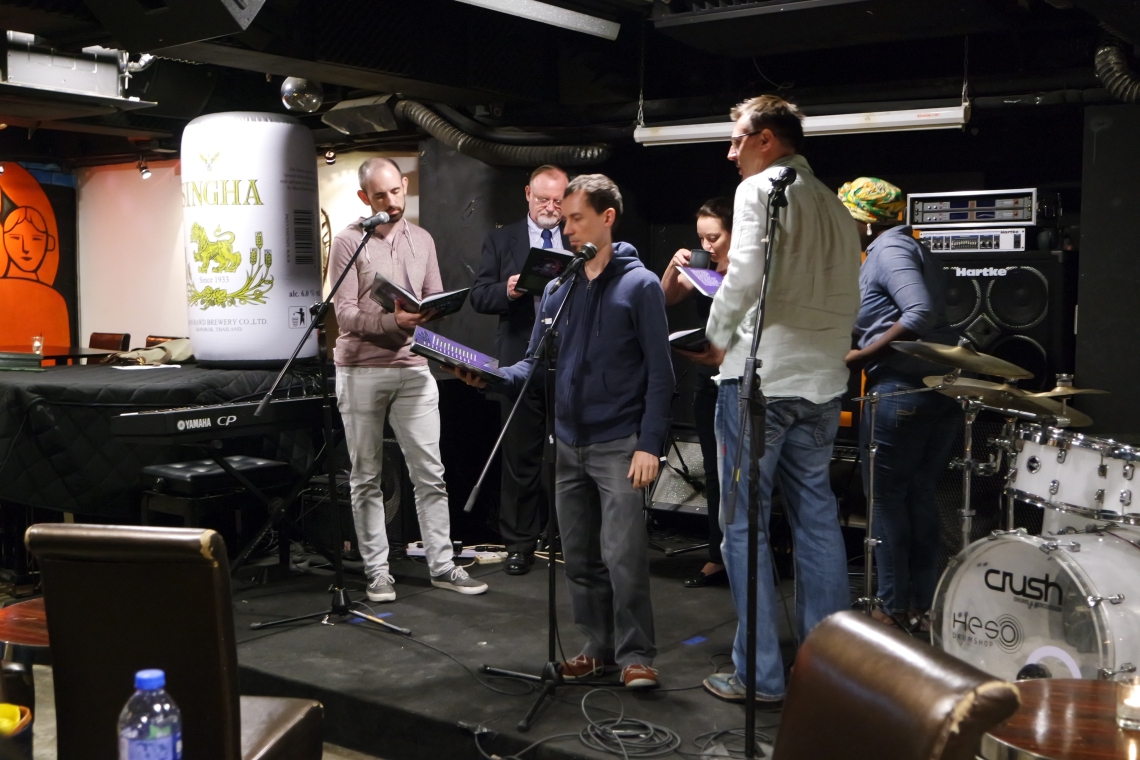
In a bar at Lan Kwai Fong, a famous place for drinking and clubbing in Hong Kong, a group of people gather to have an open mic every Wednesday night to share poems that they love or their own work.
Poetry in Hong Kong is mainly written in English and Chinese language as the city is mixed with Eastern and Western culture. Under the cross-culture experience of Hong Kong based-poets, poems in Hong Kong present local life and events such as the Umbrella Movement as well as universal themes.
Poetry is an important literary genre in the history of literature. In Hong Kong, many people like reading and writing poems, including classical and modern poetry, said a spokesperson for the Education Bureau.
Henrik Hoeg, the emcee of Peel Street Poetry, Hong Kong’s premier weekly open mic for poetry, is a Hong Kong-based poet who was born in Denmark but grew up in Hong Kong. He has written numerous poems including Executive Electoral Elocution and How I Remember Hong Kong to show how he feels living in such big city.
Hong Kong poetry can be categorised to academic and a new genre that emerged last year written by youngsters or students to express their view to the society, he added.
“Poetry is not uncommon in Hong Kong, people just don’t know there is a scene,” said the emcee of the open mic.
In the past years, there were only 20 people attending the open mic at Lan Kwai Fong, while more than 40 people came to the event every Wednesday night this year, said Hoeg.
Open mic of poetry was held once a month in Denmark while the one in Hong Kong was held once a week. Last year, there were multiple Poetry Outloud events and more people were engaging in, he added.
Reading poetry is not as boring as most people think, we can get a glimpse of history and current affairs through poems, said Ms Kelly Yik Ka-lam, a student studying Chinese Literature who went to an event organised by Poetry Outloud at Hong Kong Baptist University.
The language curriculum mainly focuses on poems that were written more than 50 years ago, for instance, students have to study World War II poetry in English Literature. Under the curriculum of Chinese Language, students are required to learn poems from Tang Dynasty rather than modern poems in recent years.
Students lose their interest in poetry because they cannot relate to the poems and they do not have the experience of living at the time when the poems were written, Hoeg said.
Schools can integrate local poetry into the curriculum to arouse students’ interest in poetry, he added.
The Education Bureau introduced 12 pieces of compulsory Classic Chinese learning material this year while only two out of twelve are poems which are Tang and Song poetry.
Some teachers do not teach poetry in class because it is not a mainstream genre. Most importantly, poetry is rarely tested in public examinations so students are not motivated to read poetry, said Ms Mang Hoi Ting, a Chinese Language teacher.
Even though poetry is not tested, some teachers choose poems for students to read because of the rich emotions and literal and figurative language, Ms Mang said.
The spokesperson of the Education Bureau suggested that schools can adopt different strategies to arouse students’ interest in poetry in their campus.
For instance, schools can organise poetry appreciation clubs and poetry writing competitions in schools. Meanwhile, teachers can encourage students to participate in various activities about poetry including the Classical Chinese Poetry and Recitation Competition by the HK Youth Cultural and Arts Competitions.
Due to limited budget, Peel Street Poetry can only set up website and do promotion on Facebook to get more exposure, said Hoeg.
Other than sharing his poem in the open mic, Hoeg is going to publish a book of poetry next year to reach more readers.
